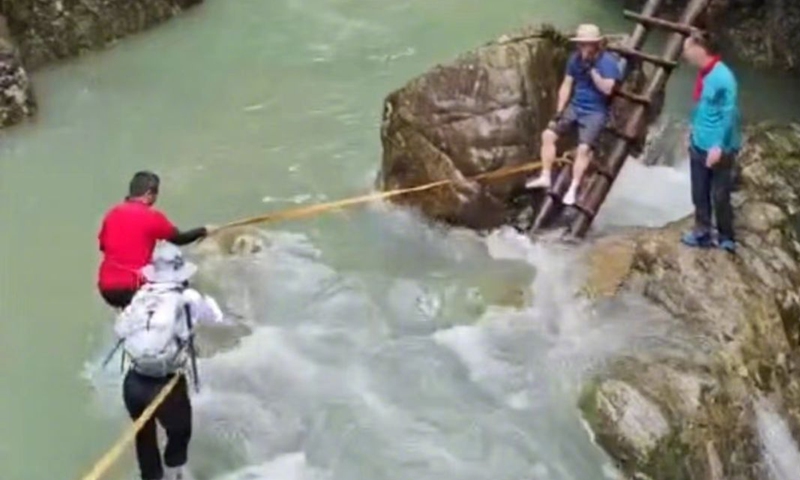Trapped campers during holidays put healthy development of outdoor sports under spotlight

Two hikers fall into a swift current in East China's Jiangsu Province and have been confirmed dead. Photo from web
Multiple cases of "hikers and campers getting trapped or injured" have been reported over the Dragon Boat Festival holidays, putting regulation and healthy development of outdoor sports under the spotlight.
The latest deadly case took place in South China's Hainan Province during which 25 hikers were trapped in an isolated forest area, leaving one dead.
Tourists in Kunming, Southwest China's Yunnan Province found themselves waking up in water on Sunday as their campsite was flooded by a nearby river due to heavy downpours. The campsite charged near 300 yuan ($41) for overnight use of each tent.
The campers who posted their experience online said they were awoke by other campers at 4 am in the morning as many nearby tents were inundated with flood waters. They complained that the site operator did not fulfill their duty of providing a safety warning.
A man surnamed Yang in Fushun, Northeast China's Liaoning Province saved five people from a fast moving upstream flood.
A hiker who visited Wutai Mountain in North China's Shanxi shared online her experience on Tuesday about how she was left unconsciousness by a roe deer. She regained consciousness later. "It would be really dangerous if I didn't, as transporting an injured person from deep in the mountains to hospital is extremely difficult.
There were other unverified reports of accidents and injuries during the holidays across multiple social media platforms, sounding an alarm for outdoor sports safety.
A Beijing-based outdoor enthusiast surnamed Sun told the Global Times that hiking, camping and other outdoor activities have grown from a niche community to a popular pursuit over the past few years.
Apps like Xiaohongshu have played an important role in driving the "outdoor sports craze," Sun said, adding that some outdoor goers shared beautiful, "edited" pictures and claimed the routes were "easy for people with legs" for likes and clicks.
Those irresponsible posts misled many to join the sports beyond their capabilities, without being fully aware that such activities contain risk and can leave participants in challenging situations, Sun said.
There have been calls on platforms to control such messages, and Sun also noticed that with reports of injuries and deaths emerging, there are safety alarms shared by other netizens under such "advertising posts. "
Xiang Bei, an enthusiast who also works as an outdoor guide for a travel agency, told the Global Times that in the past, hikers usually have the basic knowledge for outdoor activities, know their limits and understand the risks. They recruit local guides or turn to professional companies for guarantee.
But the booming market has attracted some amateurs to join in - the organizers themselves may lack necessary knowledge and qualification, Xiang said.
The Global Times learned that some small-scale organizers who claim to run "hobby clubs" are making profit from these itineraries. To solicit more customers, these "clubs" are not strict on participant qualification.
Analysts stressed that people should carefully assess the risks and their abilities, be responsible for themselves, and turn to legitimate, qualified operators to minimize the risks.